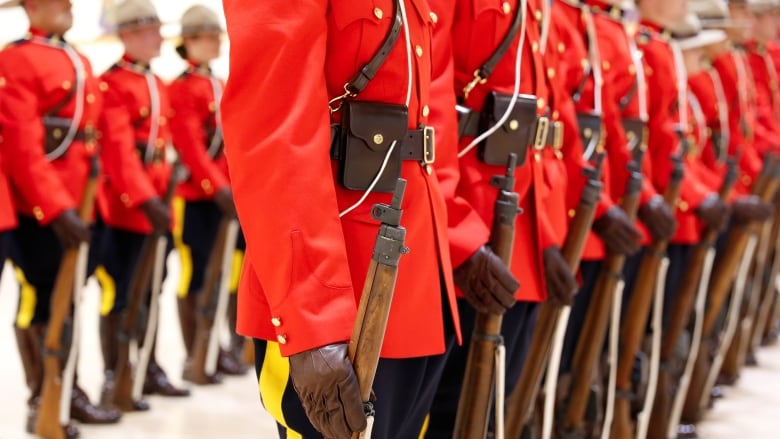After years of claims that sexual predators and harassers have been allowed to serve in the RCMP with few consequences, the federal government is promising to review how the police service disciplines its members.

It’s been years since Cathy Mansley wore her RCMP uniform. She still gets upset talking about her exit.
The former constable said she was the target of discrimination and sexual advances — including unwanted touching — throughout her career.
“When I became more vocal about how I was being treated at work and how I wasn’t being helped, especially after I asked for help, everything just went downhill from there,” she told CBC News from her home in Cape Breton.
Mansley said that, despite complaints to the chain of command, the officer who she says touched her and others was allowed to retire. She said she spiralled as a result, began drinking too much and eventually left the RCMP after 24 years with a medical discharge.
“He left behind a [lot] of ill people, you know,” she said, referring to the officer she accused of abuse. “Really, it’s sad, the damage that that does.”
After years of claims that sexual predators and harassers have been allowed to serve in the RCMP with few consequences, the federal government is promising to review how the police service disciplines its members.
Public Safety Minister Marco Mendicino’s post-election mandate letter tasked him with launching “an external review of the RCMP’s sanctions and disciplinary regime to determine the adequacy of existing sanctions and whether they are applied properly and consistently.”
A spokesperson for the minister said the review will look at how the RCMP handles sexual misconduct in the ranks.
“We know there remains more work to be done and RCMP reform is one of Minister Mendicino’s top priorities,” said Alexander Cohen.
“We will work closely with a wide array of stakeholders — including former members who’ve experienced harassment — to ensure that every member of the RCMP feels safe and respected.”
The RCMP has been accused for years of imposing inadequate sanctions on Mounties in cases of harassment and sexual assault.
In his scathing 2020 report on the RCMP’s internal culture, former Supreme Court justice Michel Bastarache said he heard alleged victims of sexual misconduct accuse the RCMP of letting perpetrators slide with next to no “consequences.”
“I frequently heard from claimants that they would never use the harassment process as it was a horrific and difficult process which resulted in retaliation and little or any consequences for the perpetrator,” he wrote.
The force has paid out millions of dollars to more than 2,300 victims as part of the historic Merlo-Davidson settlement agreement, which was the result of a class action lawsuit related to sexual harassment of women within the RCMP.
Discipline varies
A CBC investigation last year found that penalties meted out to Mounties for sexual misconduct vary widely.
According to a review of more than 90 publicly available decisions, seven Mounties found guilty of discreditable sexual activity by the conduct board have been let go for their actions since 2017.
In one of the most recent cases, an Alberta RCMP officer was discharged after he tried to facilitate a sexual relationship through inappropriate text messages with a 16-year-old girl.
Another 15 RCMP officers have been punished for sexual misconduct while being allowed to stay on. Their conduct ranged from non-consensual touching to voyeurism to starting a relationship with a minor.
Six Mounties involved in domestic violence — including one officer who hit his daughter so hard her nose bled — were given pay cuts or transferred as punishment.
Investigations need to be faster: union
After the Bastarache report was released, RCMP Commissioner Brenda Lucki announced the creation of the Independent Centre for Harassment Resolution. Launched in June of last year, the centre uses external investigators to probe complaints of sexual misconduct and harassment within the force and has the power to recommend discipline.

As of Dec. 31, 2021, 373 files had been sent to the centre for investigation.
The head of the RCMP’s union said any change to the discipline system needs to be fair for both the complainant and the accused.
“Especially when you’re looking at something where dismissal is on the table, you could lose your job, you could lose your livelihood, you could possibly lose a portion of your pension — you need to have the ability to make those decisions in a procedurally fair manner,” National Police Federation President Brian Sauvé told CBC News earlier this month.
Sauvé said that despite the RCMP’s recent promises to take harassment claims more seriously, the disciplinary process is backlogged, largely due to a lack of independent investigators.
“The challenge that we’re seeing is the time it’s taken for these things to be investigated, for decisions to be made and for corrective measures to be implemented,” he said.
“But hopefully, we’ll get to a place where the two-year, three-year, four-year decision making process comes back down to something that’s reasonable and both parties involved can have closure in a reasonable timeframe.”
‘I’ve lost a lot of faith’
RCMP spokesperson Robin Percival said the police service plans on having the centre fully staffed by July of this year.
“The ICHR has an ongoing dialogue with bargaining agents on operations, and we expect that over the next six months, as the ICHR becomes fully staffed, there will be continued progress on handling complaints and, also, on developing approaches for harassment prevention, which is key to reducing the volume of complaints over time,” she said.
Mansley, a claimant in the Merlo-Davidson settlement, said she hopes the government’s review of the RCMP’s disciplinary system will lead to changes.
She said she’s not optimistic.
“I’ve lost a lot of faith in anything that they say, especially after what I’ve seen personally, and what we all know from past experiences,” she said.
“I’ve not seen them ever take responsibility for their own actions.”

